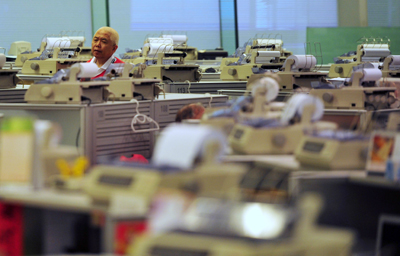Thursday, 13 August 2015 13:17
 HONG KONG: Asian shares staged a relief rally Thursday and regional currencies gained after China reassured markets it would not allow the yuan to plummet after a surprise devaluation this week.
HONG KONG: Asian shares staged a relief rally Thursday and regional currencies gained after China reassured markets it would not allow the yuan to plummet after a surprise devaluation this week.
The dollar inched higher, after taking a knock in New York from speculation the US Federal Reserve will delay hiking interest rates following China’s devaluation of the yuan.
Tokyo closed up 0.99 percent, or 202,78 points, to 20,595.55 and Sydney rose 0.11 percent, or 5.82 points, to 5,387.9.
Seoul rose 0.4 percent, or 7.99 points, to 1,983.46 after the South Korean central bank left its key rate at a record low.
Hong Kong added 0.53 percent and Shanghai rose 0.12 percent in afternoon trade.
China cut the reference point for the yuan against the dollar for the third consecutive day Thursday, reducing the rate by 1.1 percent from the previous session.
The cut, which was smaller than those in the previous two days, and news the central bank intervened to stabilise the yuan on Wednesday reassured dealers Beijing would not allow its currency to plummet.
People’s Bank of China assistant governor Zhang Xiaohui further supported markets Thursday when he said there is no basis for extended depreciation and the central bank can keeping the yuan at an equilibrium.
“It’s likely the worst is over,” Patrick Bennett, a strategist at Canadian Imperial Bank of Commerce in Hong Kong, told Bloomberg News.
“PBOC intervention has calmed the market. There is not a sense that the onshore yuan will weaken forever.”
– ‘Investors are recovering’ –
==============================
Two previous cuts to the reference rate sparked concerns that China’s economy is weaker than previously thought and fears that a fall in the yuan could spark a race to the bottom in forex markets.
The reductions came after China on Tuesday adopted a more market-oriented method of calculating the currency rate, widely seen as a devaluation, which sent ripples through global financial markets.
The reductions hit commodities along with stocks in Europe and Asia, boosting safe-havens gold and bonds and prompting the worst two-day selloff in currencies in Asia-Pacific since 1998.
But an afternoon comeback on Wall Street, led by Apple and energy stocks also cheered dealers in Asian equities.
“The PBOC will continue to intervene and guide the yuan to a reasonable equilibrium level,” Tommy Xie, an economist at Oversea-Chinese Banking Corp. in Singapore, told Bloomberg News.
“Investors are recovering from the last two days of panic.”
Asia-Pacific currencies, including the Indonesian rupiah, Philippine peso and South Korean won, gained Thursday as fears receded that China could launch a currency war to make its exports more competitive.
In Tokyo afternoon trade the dollar changed hands at 124.39 yen, up from 124.24 yen in New York, where it took a hit on fears Beijing’s moves could delay a US interest rate hike.
In other trading, the euro changed hands at $ 1.1136 and 138.62 yen against $ 1.1159 and 138.63 yen in New York.
Oil prices gained Thursday, edging up from a six-year low in New York on news US oil supplies declined and the dollar retreated.
US benchmark West Texas Intermediate for September delivery turned higher in afternoon trade, rising 10 cents to $ 43.40. Brent crude for September gained 15 cents to $ 49.81.
Safe-haven gold fetched $ 1,121.30 compared to $ 1,117.50 late Wednesday.
In individual shares, Lenovo dropped 9.21 percent to HK$ 7.69 after the world’s biggest personal computer maker said first quarter net profit more than halved, and announced it would cut around 3,200 staff from its non-manufacturing workforce.
Australia’s Telstra fell 2.24 percent to Aus$ 6.10 after the telecoms company said annual net profit fell one percent to Aus$ 4.23 billion after the sale of Hong Kong mobile business CSL.
Chinese Internet giant Alibaba closed more than five percent lower in New York at $ 73.38 after a disappointing quarterly report showed sales growth cooling.
In other markets:
— Wellington lost 0.34 percent, or 19.51 points, to 5,737.70.
Spark New Zealand fell 1.44 percent at NZ$ 2.73 and Fletcher Building dropped 0.39 percent to NZ$ 7.61.




























